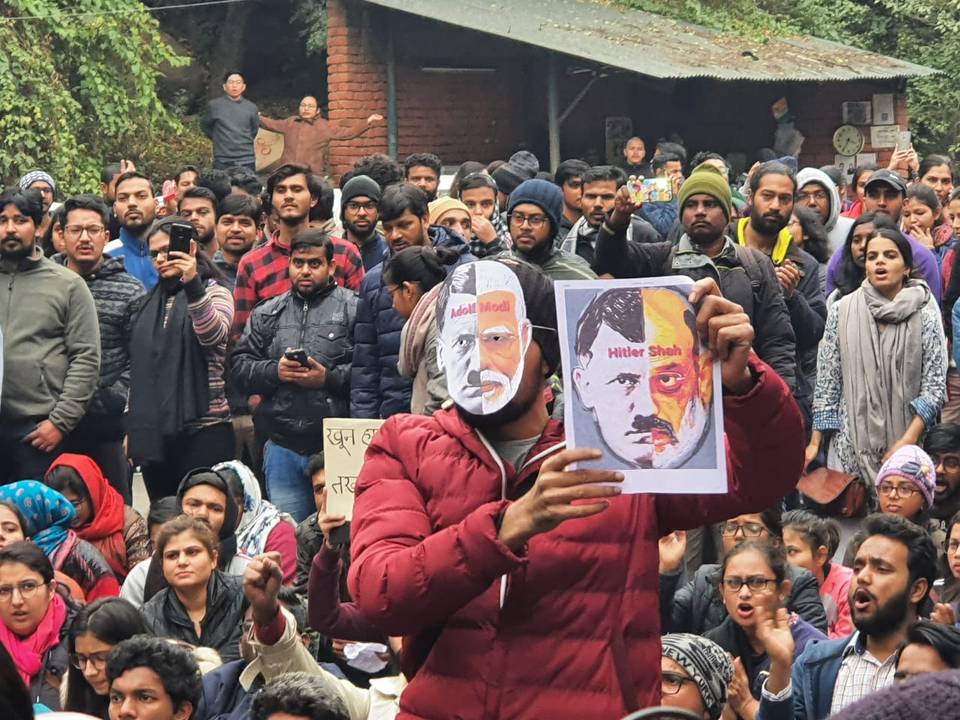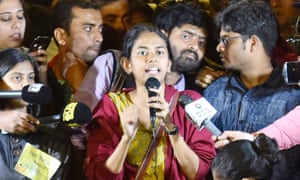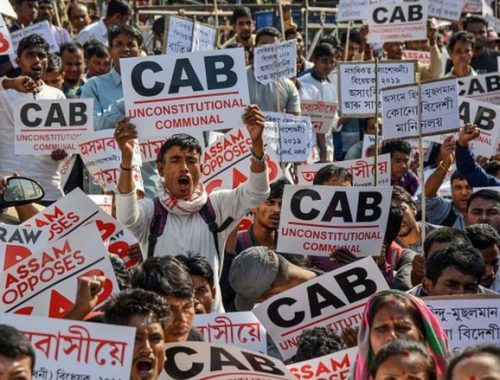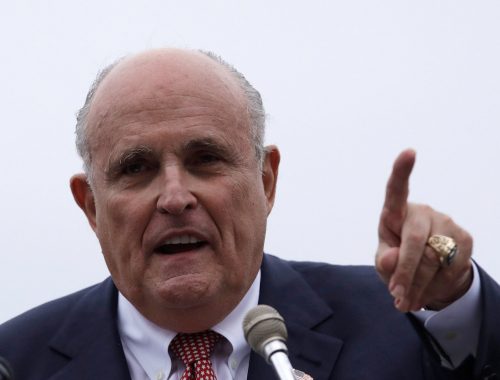Student leader beaten with iron bar during attack charged with two offences for prior incident
Police in Delhi have faced criticism for failing to arrest any members of a violent mob that stormed the campus of the Jawarharlal Nehru University (JNU) in the Indian capital, while at the same time charging a student leader beaten over the head with a metal bar with two offences.
Police have been accused of failing to intervene when about 50 masked men went on the rampage on Sunday evening, attacking students and academic staff, and vandalising buildings and property. More than 30 people were injured.
Aishe Ghosh – the leader of protests at the university in Delhi – needed about 16 stitches for a deep gash in her head. On Monday she said she only survived by falling down and playing dead, adding that she felt as if she was being “lynched”.
“They first vandalised a car parked nearby before besieging us. My sister managed to escape, but my friend and I were caught by the mob. They first struck me on my head with a rod before kicking and thrashing me.
“I screamed at them that they couldn’t do that, but they didn’t stop,” she said. Ghosh and other students have called on the university’s vice-chancellor, Jagadish Kumar, to resign over the incident.
Delhi police have yet to identify or detain any assailants. They say they are currently examining video clips and WhatsApp chats.
Meanwhile, they have charged Ghosh, and several other students, with attacking security guards during a prior incident on Saturday. They are accused of vandalising a server room and of destroying fibre-optic cables.
“They damaged servers and made it dysfunctional. They also damaged fibre-optic power supplies and broke the biometric systems inside the room,” said the police complaint.
Police failing to act in India is nothing new. But their apparent failure to defend the students comes amid major nationwide protests against a new citizenship bill that critics say is anti-Muslim. At least 23 people have been killed. Tens of thousands have taken to the streets.
Narendra Modi’s rightwing Hindu nationalist government introduced the law last month. Students have largely led demonstrations against the bill with JNU – long associated with leftwing politics – at the forefront of anti-government activity.
While the political blame game between the ruling Bharatiya Janata party (BJP) and its rivals continues, JNU students who witnessed the violence say they can identify many of the assailants, despite the masked faces, as members of the Akhil Bharatiya Vidyarthi Parishad (ABVP), the student wing of the BJP.
The contrast between the police alacrity in charging Ghosh and their seeming inaction over the mob has come in for criticism. “How dare she stop a nationalist iron rod with her head?” asked the poet Javed Akhtar mockingly on Twitter.
The political analyst Arati Jerath called the violence “an unprecedented rampage by a mob at a university in the heart of the capital” and said someone had to be held accountable.
“It’s been a total dereliction of duty by the police. To charge Ghosh is laughable. But the JNU administration is equally responsible. The vice-chancellor, the proctor, they were all missing. It shows the institutional breakdown at JNU,” she said.
Delhi police are examining a claim by an unknown Hindu fringe group, the Hindu Raksha Dal, that it carried out the attack. “JNU is a hotbed of anti-national activities. We can’t tolerate this. We take full responsibility of the attack … and would like to say that they were our workers,” its leader, Pinky Chaudhary, told the ANI news agency.
BJP critics suggest the claim could be an attempt to deflect blame from the BJP’s student wing, in order to exonerate the governing party and its supporters.
Ten trade unions have called for a general strike on Wednesday to protest against what they called the government’s “anti-people” policies. They said they expected 250 million Indians to participate.
As condemnation of the attacks spread, more than 1,000 people held a vigil on Monday in Mumbai. Other demonstrations were held in Bengaluru, Kolkata and other major cities.
Modi’s BJP denied claims by the opposition Congress party that it was responsible, and in turn blamed left-leaning student groups which dominate the university’s politics.
The government has promised an investigation, while the home minister, Amit Shah – a close Modi aide – told university administrators and police to maintain order at the campus, which has been tense since protests in November over fee increases.





